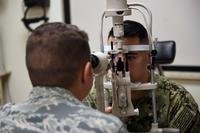The 2018 military budget has passed the House and Senate with some minor differences.
These differences will now be ironed out in committees made up of members of both the House and Senate.
If you remember how a bill becomes a law, these committees will shuttle amendments back and forth until an agreement can be reached and the bill is sent to the president's desk for signature later this year.
We all know the $700 billion bill will be paying for new weapons systems, ships and most likely a pay raise, but what is buried deep within its 1,200+ pages?
Like most laws it includes good things, bad things, and strange things. Lets take a look at some of these and how the budget will really affect most military members.
The House Bill
- adds a $15M "Hacking for Defense Program" which would recruit veterans and civilians to develop cyber-based military tools
- creates a study group to possibly redesign maternity uniforms
- creates a pilot program to use retired senior enlisted Army National Guard members as recruiters
- modifies the DD-214 to add an email address field
- adds service wide mandatory annual training regarding "attempts by the Russian Federation and its proxies and agents to influence and recruit members of the Armed Forces as part of its influence campaign"
- gives families of deceased veterans a one-time free replacement of lost military decorations
- creates the Congressional Defense Service Medal which is awarded to a group for "the exemplary service or significant achievement in furtherance of the defense and national security of the United States"
- awards the Vietnam Service Medal to veterans who participated in Operation End Sweep or the Mayaguez rescue operation
- creates an “Atomic Veterans Service Medal” to honor radiation-exposed veterans
- allows active duty members to register to vote in the state in which they are stationed
- pays up to $500 for separating members to get a license or certification required for employment
- allows a spouse to claim residence in the state where a member is stationed when applying for a firearms ID card
The Senate Bill
- allows caregivers to attend separation counseling sessions
- creates a pilot program to partner with public and private nonprofits to help separating members get jobs
- limits BAH of dual servicemember families to the without dependents rate for each member
- allows Tuition Assistance payments for cybersecurity, coding or related classes
- begins a study on the health effects of polyfluoroalkyl (found in firefighting foam) which has contaminated water sources near many military bases
- adds the Department of Agriculture to TAP processing to discuss grants, loans, and encourage veterans to consider agricultural or livestock jobs
- cracks down on debt collectors on base
- creates a pilot program to enroll Tricare for Life members in a Medicare Advantage plan
- slight increases in Tricare pharmacy costs for drugs
- adds questions about gambling disorder to the Annual Periodic Health Assessment
- requires the use of open-source software instead of store-bought software for unclassified systems
Both Of The Bills
- seek to increase the size of the Army by at least 5,000 soldiers, decrease the Navy by nearly 3,000 sailors, keep the Marine Corps at about its current level, and increase the Air Force by about 5,000 airmen
- seek slight increases in the reserve force levels
- add court-martial punishment for the unauthorized sharing or distribution of "an intimate visual image of a private area of another person"
- allow families of certain PCS'ing members to temporarily remain in gov't housing at the old duty station if there is housing available, they may alternatively draw BAH at the old duty station. This applies only to INCONUS families with a spouse who is working or going to school, families with kids in school, families with dependents in the Exceptional Family Member Program, or families caring for an immediate family member with a chronic or long-term illness
- reimburse spouses up to $500 to get a new business license or certification if the member PCS's to another state
- increase the maximum bonus for aviators
Which of these proposals will make it into the final budget? Only time will tell.




